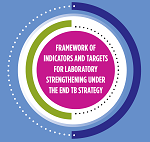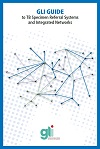GLI Core Group elects new Chair and welcomes four new members
The GLI Core Group is happy to announce the election of a new Chair and four new members for the 2022-2023 term. Dr. Marguerite Massinga Loembé, member of the Core Group since 2021, was elected Chair by majority vote. Dr. Massinga Loembé is a Senior Science Manager at the African Society for Laboratory Medicine (ASLM) in Libreville, Gabon. In addition, four new Core Group members were selected by objective review of applications and include: Dr. Andrea Cabibbe, a Research Associate at the San Raffaele Scientific Institute, Milano, Italy; Dr. Sushil Pandey, the Chief Scientist at Queensland Mycobacterium Reference Laboratory, Brisbane, Australia; Dr. Leen Rigouts, the Senior Scientific Expert at the Institute of Tropical Medicine, Antwerp, Belgium; and Dr. Léon Sawadogo, the Laboratory Manager at the Centre National de Lutte Antituberculeuse (CNLAT), Ouagadougou, Burkina Faso. While welcoming these new TB laboratory experts to GLI, the Core Group would like to express deep thanks to the members that have completed their terms – Dr. Maka Akhalaia, Dr. Uladzimir Antonenka, and Dr. Abiola Tubi - for years of expert contributions to Initiate.
Planning and Budgeting Tool for TB and drug resistant TB testing
The Global Laboratory Initiative (GLI), with its secretariat at the World Health Organization (WHO) Global TB Programme, is pleased to release a Planning and Budgeting Tool for TB and Drug Resistant TB Testing for calculation of quantities and costs of diagnostic products and laboratory supplies. The tool references product numbers and prices in the Stop TB Partnership Global Drug Facility (GDF) Diagnostics, Medical Devices, and other Health Products Catalog.
The toolkit includes a semi-automated, editable, Excel-based calculation tool and an accompanying User Guide that explains editable fields and methods for calculation of goods within each Excel worksheet. Importantly, tool calculations take country-specific epidemiology and diagnostic algorithms into account when considering each user’s diagnostic product and laboratory supply needs. Worksheets with calculation tables are included for all WHO recommended diagnostic and drug susceptibility testing methods as well as items related to biosafety, cleaning, equipment maintenance and repair.
The tool presents users with an automated annual Budget Summary that provide users with an overview of items for testing, cleaning, and biosafety as well as maintenance and repair costs. Lastly, an automated annual Laboratory Items Summary provides a list of all items to be purchased and associated total costs based on user inputs.
The Tool and User Guide are available on the GLI website and on the WHO website.
Planning and budgeting tool for TB and drug resistant TB testing: calculation tool
Planning and budgeting tool for TB and drug resistant TB testing: User guide
New GLI Core Group Members
28 July 2021 - The Global Laboratory Initiative (GLI) is happy to announce the election of three technical experts who joined the GLI Core Group this month: Alex Durena, Kristin Kremer and Tetsuhiro Sugamoto.
The many experiences and perspectives they bring to GLI will be of great benefit to continuing building and sustaining high-quality TB diagnostic networks and strengthening laboratory capacity at the country, regional and global level. For more information about the Core Group, please click here.
GLI core group collaborates with various partners on the development of the "Score TB Package"
26 May 2021 - GLI is pleased to announce the launch of the Score-TB package, a tool to help build quality-assured TB testing and management capacity utilizing the SLIPTA methodology. The Score TB Package combines TB test-specific Scorecards and the SLIPTA checklist in traditional and automated e-tool formats to facilitate user-friendly quality assessment of modern TB laboratories.
The Score-TB Package is intended to inform Ministry of Health officials, health facility and laboratory managers, donors, implementing partners, quality assurance personnel, programme managers and supervisory staff at national, regional and facility levels on international standards for delivering quality-assured TB testing and serve as a comprehensive, updated toolkit for quality management system assessment at individual TB laboratories. For more information, please click here.
GLI launches its Guide to TB Specimen Referral Systems and Integrated Networks
13 October 2017 - Efficient specimen referral systems contribute to optimal and timely access to TB diagnostic and treatment services. This guide provides practical information that will help developing and improving the efficiency of the specimen referral systems by establishing integrated solutions.
Targeting TB programme and laboratory managers, as well as other key stakeholders across various disease programmes, this guide presents a stepwise approach that aims at facilitating the planning and coordination of specimen referral systems, and also provides TB-specific considerations for collection, storage, packaging and transport of specimens.
GLI core group collaborates with WHO on development of Framework of indicators and targets for laboratory strengthening under the End TB Strategy

18 October 2016- The End TB Strategy calls for the early diagnosis of TB including universal drug-susceptibility testing (DST), and a prerequisite for any national TB programme to reach this goal is a quality-assured laboratory network equipped with rapid diagnostics. The newly published WHO Framework of indicators and targets for laboratory strengthening under the End TB Strategy, developed in collaboration with a team from the GLI core group, serves as a guide for all countries developing plans for laboratory strengthening during 2016-2025.
The 12 core indicators under the Framework measure programmes’ capacity to detect TB accurately and rapidly using new diagnostics, provide universal DST, and ensure the quality of testing. These indicators will be monitored globally by WHO as countries progress towards reaching the targets. The Framework also provides methods for calculating country-specific targets for the numbers of tests and facilities needed for each of the main diagnostic technologies. Given advancements in diagnostic technologies and the need for country-specific targets that consider epidemiology and issues of patient access, the previous global targets that were based on numbers of facilities relative to the general population (1 microscopy center per 100,000 population, 1 culture facility per 5 million population, etc.) are no longer recommended.
The Framework is available online at www.who.int/tb/publications/labindicators
1st Global Laboratory Initiative for Africa (GLI Africa) Country Workshop held in Uganda
Over 100 participants gathered in Kampala, Uganda, for the 1st GLI Africa Country Workshop on Strengthening TB Diagnostic Networks in Africa. The three-day workshop (19-21 July 2016) brought together representatives of National TB Control Programmes and National TB Reference Laboratories from more than 20 African countries, technical partners, multilateral agencies, donors, and other key stakeholders.
The workshop identified key priorities for strengthening TB diagnostic networks in Africa, and included discussions on improving the interface between laboratories and clinicians, building country-specific specimen referral networks, implementing new WHO policies and GLI practical guidance and tools, establishing electronic data connectivity solutions, and coordinating technical assistance. Participants also drafted the Kampala Declaration, which describes the next steps needed to strengthen TB diagnostic networks on the continent and affirms the role of GLI Africa as a partnership that can drive these steps forward.
GLI Africa was established in 2014 to support countries in the African region to achieve quality-assured, accessible and sustainable TB laboratories services. GLI Africa drives the adaptation and dissemination of global WHO policies and GLI practical guidance and tools, by coordinating technical assistance and building regional capacity to support its TB diagnostic networks.
The current Chair of GLI Africa is Amy Piatek (USAID) and the Vice-Chair is Kekeletso Kao (FIND). Core group members include Heidi Albert (FIND South Africa), Heather Alexander (CDC, current GLI chair), Affolabi Dissou (candidate SRL Benin), Yala Djamel (SRL Algeria), Jean Iragena (WHO Regional Office for Africa), Nazir Ismail (SRL South Africa), Moses Joloba (SRL Uganda), Teferi Mekonen (ASLM), Philip Onyebujoh (WHO Regional Office for Africa) and Tom Shinnick (former GLI chair). The GLI Africa secretariat function is provided by Obert Kachuwaire (ASLM). This 1st GLI Africa Country Workshop on Strengthening TB Diagnostic Networks was made possible with funding from USAID and PEPFAR.
GLI core group elects three new members
The GLI core group is happy to announce the election of three new members for the 2016-2017 term: Dr Lucilaine Ferrazoli, Dr Nguyen Van Hung and Dr Elisa Tagliani. Dr Ferrazoli is a research scientist in the TB and Mycobacteriology Laboratory of the Adolfo Lutz Institute in Sao Paolo, Brazil. Dr Hung is the Head of Department at the National TB Reference Laboratory at the National Lung Hospital in Hanoi, Vietnam. Dr Tagliani is a research scientist at the Emerging Bacterial Pathogens Unit of the San Raffaele Scientific Institute in Milan, Italy (SRL Milan).
The core group would like to deeply thank the members that have completed their terms - Dr Maria Alice da Silva Telles, Dr Armand Van Deun, Dr Richard Lumb and Dr Paul Klatser - for their years of contributions to the group.
Dr Heather Alexander, elected as Chair of the Core Group of the Global Laboratory Initiative (GLI)
Dr Heather Alexander was elected as Chair of the Core Group of the Global Laboratory Initiative (GLI) by the Core Group members. Dr Alexander joined the U.S. Centers for Disease Control and Prevention in 2005 and is currently the CDC Division of Global HIV and Tuberculosis (DGHT) TB and Clinical Monitoring Team Lead, expanding her efforts in support of integrated, patient-centered diagnostic laboratory capacity building.
During her tenure as a microbiologist in the Division of TB Elimination, International Research and Programs Branch, Dr. Alexander worked with the Foundation for Innovative New Diagnostics (FIND) to manage collaborative multidrug-resistant TB diagnostic evaluations and implementation studies in several countries including the Russian Federation, Uzbekistan, Nepal, and the Philippines, contributed to the development of WHO TB diagnostic policies, and conducted applied TB research in collaboration with DTBE’s Laboratory Branch.
In 2010, Dr. Alexander joined the Division of Global HIV/AIDS (DGHA), International Laboratory Branch (ILB) as the Tuberculosis and Opportunistic Infections Unit Lead. In this capacity, she focused on improving access to and uptake of rapid and accurate TB/HIV laboratory diagnostic services in PEPFAR-supported countries through strategic planning; laboratory quality management systems strengthening; implementing and assessing the impact of new TB diagnostics; and improving linkages between diagnostic testing and TB and HIV treatment.
Dr. Alexander received a Ph.D. in Microbiology and Molecular Genetics from Emory University (Atlanta, USA) in 2004 and currently is completing a Master of Public Health in Epidemiology at the same institution. She has been an active member of the GLI Core Group since 2011.
GLI core group elects four new members
The GLI core group is happy to announce the election of four new members for the 2017-2018 term: Petra de Haas, Christy Hanson, Daniel Orozco and Kaiser Shen. Petra de Haas is a Laboratory Advisor at the KNCV Tuberculosis Foundation. Dr Christy Hanson is a Senior Programme Officer on the TB Delivery Team at the Bill & Melinda Gates Foundation. Daniel Orozco is the Director of Laboratory Services at Partners in Health. Kaiser Shen is a TB Laboratory and Diagnostic Network Advisor at the United States Agency for International Development. For the complete membership of the GLI core group, click here.
The core group would like to deeply thank the members that have completed their terms - Dr Maarten van Cleeff and Amy Piatek - for their years of contributions to the group.


